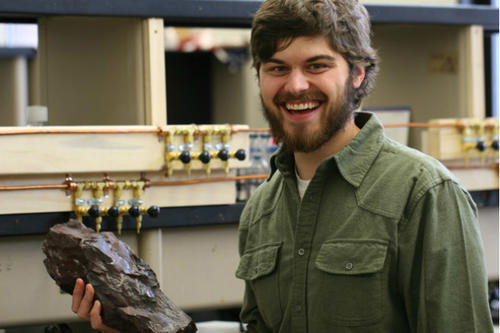
Every day brings new awareness of how bacteria can improve lives — from helping people digest food and fight infections to serving as workhorses in wastewater management, toxic chemical cleanup, and bioenergy production. A new discovery from researchers Daniel Bond, Caleb Levar and colleagues at the University of Minnesota’s BioTechnology Institute shows how a friendly microbe known as Geobacter is able to thrive in a wide range of environments and emerging biotech applications.
Researchers have long known that some bacteria get the energy they need to grow underground by acting like tiny batteries, transferring electrons from inside their cells to metals in rock, sand and clay. Using custom-made devices to make electrodes mimic high-energy metals in the environment, the research team discovered a key protein responsible for this electrical flow. Surprisingly, when the researchers removed this protein they uncovered an alternative system for tapping lower-energy metals. This indicates that bacteria like Geobacter are more versatile than previously thought.
“Before, we thought metals as different as iron and manganese looked the same to Geobacter, so we couldn’t understand why the bacterium had so many proteins for moving electrons out of the cell,” said Bond. “This study shows that, just as animals have a range of enzymes to break down fats or sugars for more or less energy, this bacterium uses different pathways to get energy from various metals in the environment."
The results, published this month in mBio, an open-access journal of the American Society for Microbiology, suggest new ways of using bacteria to remotely detect specific metals, monitoring underground chemical cleanup, and powering devices using electricity-producing microbes.
“At the most basic level, this shows that bacteria can tune their electrical output,” said Bond. “It opens a new door for understanding how they can work harder for us in fuel cells or access important metals underground.”
The research was supported by the Office of Naval Research, the Department of Energy: Biological and Energy Research (BER), and MnDRIVE: Advancing Industry, Conserving Our Environment.
- Categories:
- Agriculture and Environment





